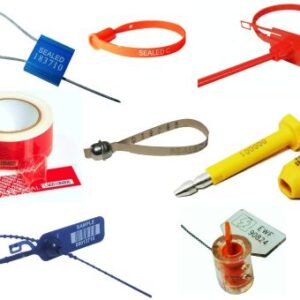Container seals are security devices used to secure shipping containers, trailers, and other storage units to prevent unauthorized access, tampering, or theft. These seals are crucial for maintaining the integrity and safety of goods during transit and storage. They provide a visual indication if a container has been opened or tampered with, ensuring compliance with security and regulatory requirements.
Key Features:
- Variety of Types: Container seals come in various types, including bolt seals, cable seals, plastic seals, and electronic seals. Each type offers different levels of security and is suited for specific applications.
- High Security: Many container seals are designed to withstand tampering and forced entry. For example, bolt seals have hardened steel components that provide robust protection against cutting or breaking.
- Tamper-Evident: Most container seals are tamper-evident, meaning that any attempt to remove or alter the seal will be immediately visible. This feature helps ensure that unauthorized access or tampering is easily detected.
- Serial Numbering and Marking: Many seals come with unique serial numbers or barcodes that can be recorded for tracking and verification purposes. This helps in maintaining a record of seal usage and monitoring the security of containers.
- Ease of Use: Designed for quick application and removal, container seals are user-friendly and do not require specialized tools for installation. They are often used with a simple locking mechanism or breaking system.
- Compliance: Container seals help meet international security standards and regulations, such as those set by the Customs-Trade Partnership Against Terrorism (C-TPAT) and the International Ship and Port Facility Security (ISPS) Code.
- Durability: Made from materials such as metal, plastic, or composite materials, container seals are built to withstand harsh environmental conditions and maintain their integrity during transit.
Types of Container Seals:
- Bolt Seals: These are heavy-duty seals made from steel, with a bolt mechanism that locks into place. They offer high security and are commonly used for shipping containers.
- Cable Seals: Consist of a steel cable with a locking mechanism. They are flexible and can be used for various container sizes and shapes. Suitable for securing trailers, containers, and large equipment.
- Plastic Seals: Made from high-strength plastic, these seals are often used for less critical applications. They are cost-effective and suitable for temporary sealing.
- Electronic Seals: Advanced seals equipped with electronic sensors or RFID technology for real-time monitoring and tracking. They offer enhanced security and can provide data on seal status and location.
- Barrier Seals: Used for sealing doors or access points with a barrier that prevents unauthorized entry. These seals are often used in conjunction with other security measures.
Applications:
- Shipping and Logistics: Used to secure shipping containers and trailers during transit, ensuring the safety of goods and preventing theft or tampering.
- Warehousing and Storage: Employed to secure storage units, warehouse doors, and other access points to protect inventory from unauthorized access.
- Customs and Security: Essential for meeting regulatory requirements and ensuring compliance with security standards during international shipping and customs inspections.
- Industrial and Commercial: Used to secure equipment, machinery, and other valuable assets in various industrial and commercial settings.
Benefits:
- Enhanced Security: Provides a reliable method of securing containers and preventing unauthorized access, tampering, or theft.
- Tamper-Evident: Ensures that any attempts to tamper with the seal are immediately visible, increasing overall security.
- Ease of Use: Simple to apply and remove, with no need for specialized tools, making them convenient for various applications.
- Compliance: Helps meet regulatory and security requirements, ensuring that goods and storage facilities adhere to industry standards.



Reviews
There are no reviews yet.